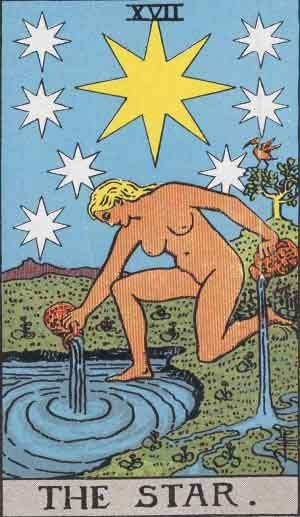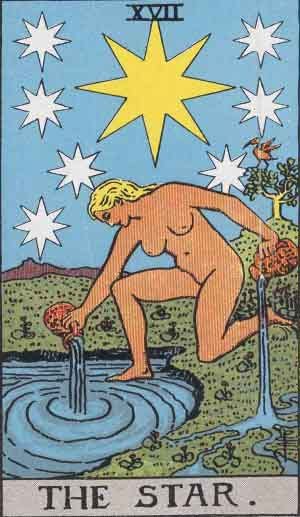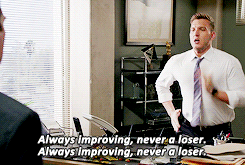Where you start isn’t where you’re going.
On BUILDING a fully-formed business rather than attempting to just ARRIVE at an existence within a fully-formed business. (Alternate title: I wasted years trying to do entrepreneurship “right.")
You will NEVER be where you’re going. You are always just going. Until you’re dead, you’re going. (Maybe even after, I don’t know, I haven’t been there yet.)
If the end of all things is so undefined, how can we assume the start of them would be?
Wait, let me start over:
The Star is one of my favorite cards to see in a Tarot reading.
It represents renewed faith and hope for the future. It comes after The Tower, one of the most disruption-heavy cards in the major arcana, so it also represents an overcoming of sorts: you made it through the rough stuff and you can look ahead to rebuilding something beautiful.
The traditional image from the Rider-Waite-Smith deck shows a bunch of stars in the sky behind this woman - eight in total, with one huge, shiny, yellow one right in the middle of the card directly above her.
Her North Star, we can assume—her heading to the future she’s going to build
As entrepreneurs, we all have our own personal Star.
A vision of the future, shining like a guiding beacon of light as we sail through the stormy, shark-and-doubt infested seas of What The Fuck Am I Doing Here Nobody Will Pay Me For This.
The fun part of this, of course, is that solopreneurs are captain and crew all at once. And maybe it’s all those hats we’re wearing - maybe it’s the low oxygen levels caused by hyperventilation -
There’s something about embarking on building a business that makes us think this is the whole thing.
Our single-minded focus creates the illusion that the little dingy we’re operating now is all it’s ever going to be, and if we want to be taken seriously as business owners, we better act like this thing is a fully-rigged galleon.
(Author’s Note: I don’t know anything about ships, but I have both been on the ride and seen the movie, Pirates Of The Caribbean.)
So what do we do next?
We pack that li’l paddleboat full of tools we don’t need, parts it can’t support, hired crewmembers we can’t afford nor have the defined space for and set a heading for waters we have no business being in right now.
And this doesn’t only happen at the very beginning of business-building, no—I see it happen again and again with every new phase of business, every turn of the corner toward growth. I’ve done it, my friends have done it, my clients do it.
That vessel we are trying to sail starts taking on water before it even leaves the harbor.
We create for ourselves an impossible situation, one where we are set up to fail, multiple times, sometimes miserably and sometimes hard enough that we quit entrepreneurship altogether.
This shows up in ways like:
Spending on ads before you even have a fully baked offer.
Hiring before you’re ready. (I have heard this advice given so many times in exactly these words and I can never make it make sense. I think it’s harmful and I think it’s bullshit. More on this later…)
Focusing on vanity metrics or measuring things that don’t actually matter in the scope of your success.
Buying expensive tools or software before you’re even sure what kinds of features you’d need.
I won’t mince words here: this shit is hard. There’s a certain amount of failure that is inevitable and necessary in order for us to ultimately move forward and succeed. So, yes, in a way the pain is unavoidable, BUT.
If you have a choice to lessen it? To circumvent some of it altogether? To make sure the pain you feel actually contributes to the gain you need in a meaningful way?
Why wouldn’t you take it?
The answer, quite simply, is that most of us can’t actually see that option.
Back to The Star:
If you look at the image, this woman actually has EIGHT different stars shining behind her. There’s one gigantor, but I also see seven other possibilities for her future here. Seven different stars by which to set her heading. Which way we orient ourselves is completely up to us, but—
The fact that we could approach this differently doesn’t occur to us because we’ve never seen it in play.
It’s almost as if the humungoid yellow star in the middle is shining so brightly, taking so much of our focus and attention, that we can’t even see the others up there.
The concept of entrepreneurship that we see online, on tv, in the movies is the kind where you have a business plan that’s laminated and bound to hand out to the investors on Shark Tank.
It’s the kind of entrepreneurship where you show a conference room of sponsors some neat looking graphs, and close the deal with equal parts spunk, heart and feigned nonchalance.
The problem becomes that because that’s the star that’s shining the brightest, we don’t even realize there are other options for us to choose and different directions we can go.
And yes, there may be a point at which you will need the lamination and the graphs and the sponsors. But setting out from the harbor is not that point.
There’s also an additional layer here.
It exists for most of the online service (and even product-based,) business owners I know, including myself:
Operating with investors is different from building capital yourself while also building the business.
I don’t currently have access to capital, venture capitalists or secret lottery winnings, do you? Most of us are building businesses with the resources we have, and they’re often pretty limited at the outset.
“Shark Tank Entrepreneurship” and this bootstrapped version we’re working with aren’t the same game. But because the former is what we have the most exposure to, we create almost immediate confusion in our businesses and how we build and maintain them by playing by rules that don’t apply—at least not in the same way.
Add to this the false-but-still-felt time-pressure created by things like 30 under 30 lists and headlines that read: “She went from -$42 in her account to a 7-figure business in less than a year with this simple strategy,” and you have a recipe for disaster:
Unnecessary anxiety, financial pressure, exhaustion that chokes off our creativity, burnout that destroys our wellbeing and a vulnerable, not yet stable business that’s being asked to solve it all without the capability to support the problem-solving.
I once had a super-dick investor ambush me at a coffee shop because he saw what I was working on. He asked me: “how will you scale that?”
This was at a moment when I was trying to understand my place in online business. Trying to understand who I wanted to help and what difference I really wanted to make.
Trying to formulate offers that made sense to me AND my audience.
Trying to make something tangible that had hitherto only existed as electrical impulses in my brain.
How will I scale it?? Are you fucking shitting me, guy?
I DON’T FUCKING KNOW.
And at that point? I DIDN’T FUCKING NEED TO.
I needed space to experiment, test out my ideas, find a single viable offer that I might be able to build upon further, create opportunities for conversation with the people who needed my help so I could learn more about them.
Scaling, growing, long-term revenue forecasting, a precise differentiator - none of that should even have been on my radar, let alone driving my goal-setting and action-taking.
But it was, oh my gahd it really, really was.
I wanted to prove to the Shark Tankers, the literal, actual baby children on the 30 under 30 lists, the Rockefeller-suit-wearing-douchewads with ivy-league MBAs, that I got entrepreneurship, and that I could build a business and live the American Dream with the best of them.
Only, I honestly DON’T get it.
In addition to perpetuating a bunch of systemic awfulness that’s literally contributing to the end of the world, the media-fueled concept of business and entrepreneurship is also incredibly limiting.
If you absolutely want the life of your vision sucked completely dry and left to crumble to ash in the dry heat of the unrelenting desert sun—please—put together a business plan on day 1 of building.
When you need to reinvent, refresh, make a change, make a new start—please—just think about how to monetize that new direction at scale.
When you need to figure out how to put your values before profit or support your clients more fully—I AM BEGGING YOU—simply let me know your forecasted percentage per-year growth and expected ROI.
Go ahead. Blow holes in that ship, then see if it floats.
The difference between having a business and having an expensive hobby is important, YES.
AND there are also so many instances in a business that are extremely necessary and valuable to its existence and continued success that cannot immediately be measured in dollars.
You’re spending time and creative energy on brainstorming, spending resources on executing new ideas, putting things out there for your clients to respond to and then synthesizing that response into meaningful data so you can form this thing into it’s ultimate iteration of a “profitable business.”
That ultimate iteration exists both: instead of and because of the concept of an expensive hobby aka: “thing I really care about and need to spend time, money and energy in order to initiate.”
What if you actually planned for that? What if you had a brainstorming budget? What if you had a “vision building account”? What if you made intentional space on your calendar for finding better ways to do business?
In short: what if we put our resources toward what was actually important to the beginning development of ANY phase of business (not just hatching the plan to start a business, but all the twists and turns and leaps and experiments,) instead of what we’ve been brainwashed to spend them on?
I spent so much time, energy, money, willpower and spirit on things that actually meant I was squandering those very resources. I only knew the versions of business building that had been sold to me.
Instead of:
trusting my own creative process
believing my instincts on who or what to trust
researching many examples of an offer being delivered many ways before structuring my own
remembering that “proof” and “social proof” are two different things that don’t always line up
aligning goals with my definition of success before setting them instead of just going
being ok with being a beginner and being seen trying (and maybe failing,)
I threw it all out the window because it was easier and less scary than asking questions and having to trust myself and my own thoughts.
Sometimes I think of it as “sunk costs,” other times I think of it as “expensive mistakes.” On my worst days, I frame it as “another example of how I’ve wasted my life.”
But always: in trying to understand what happened in the first few years of effort that I put into building my business, as I continue to ask myself “what if?” and practice truly resourcing my day-to-day, I keep returning to this undeniable truth:
Where you start is never—and I mean ever—where you’re going.
A business requires structure, clear processes, profitability. But it never begins with these things.
It starts with an idea, a theory to be tested and a desire to help—three things I find the most beautiful about humanity: creativity, curiosity and connectedness.
My question now is: can we collectively make more space for those things and allow for expansion and true growth? Or will we continue to limit and cage them as so many of us scramble for a foothold on these pathways?
The entire basis for my work is built on the belief that we can. So, even when it feels bleak, I try to remember:
Where we are now isn’t where we’re going. Where we’re going will look very different from where we are provided we keep moving.
With intentionality, through staying connected to our humanness, we can shape that destination into something better for all of us. I have to believe we can.





